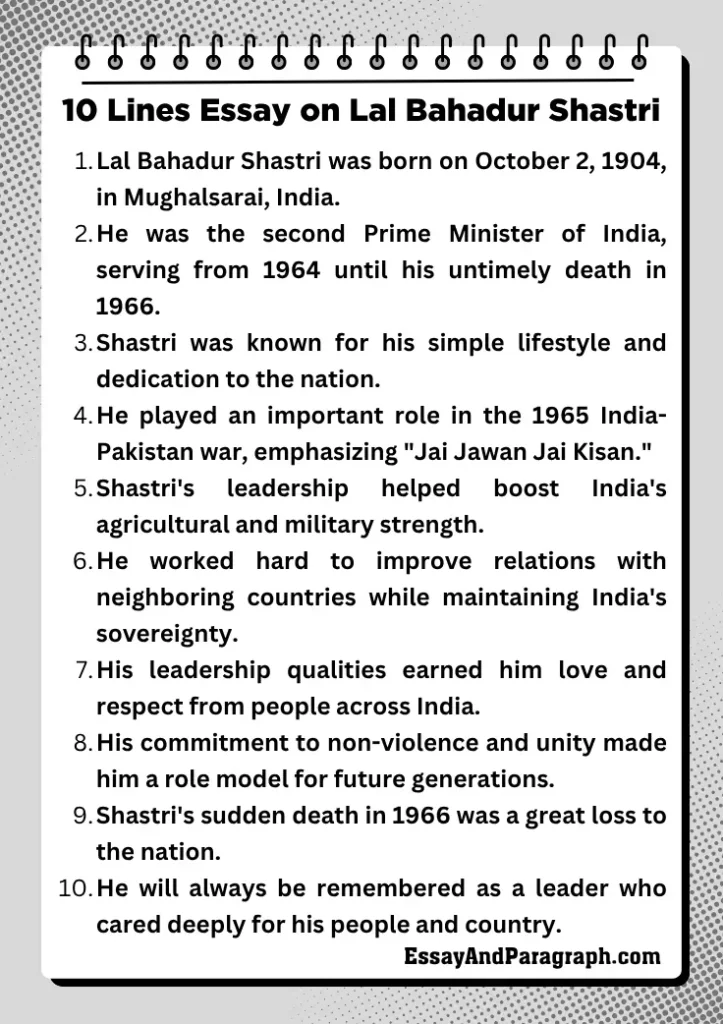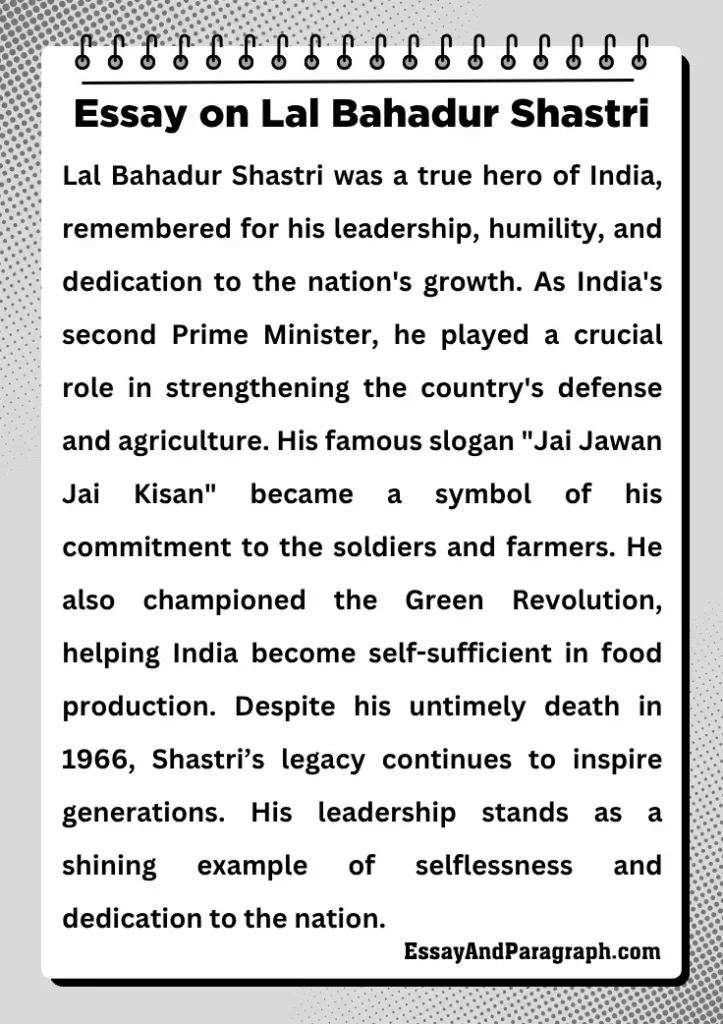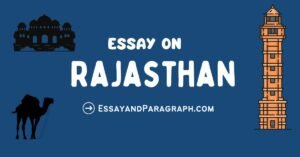Have you ever wondered who inspired millions of Indians to live by values of hard work, simplicity, and patriotism? Lal Bahadur Shastri, the second Prime Minister of India, was one such remarkable leader. Known for his leadership during crucial times, Shastri played an essential role in India’s independence movement and its post-independence era. In this article, we will learn how to write an essay on Lal Bahadur Shastri and explore the values he instilled in his people.
10 Lines Essay on Lal Bahadur Shastri in English for Students
Lal Bahadur Shastri was born on October 2, 1904, in Mughalsarai, India.
He was the second Prime Minister of India, serving from 1964 until his untimely death in 1966.
Shastri was known for his simple lifestyle and dedication to the nation.
He played an important role in the 1965 India-Pakistan war, emphasizing “Jai Jawan Jai Kisan.”
Shastri’s leadership helped boost India’s agricultural and military strength.
He worked hard to improve relations with neighboring countries while maintaining India’s sovereignty.
His leadership qualities earned him love and respect from people across India.
His commitment to non-violence and unity made him a role model for future generations.
Shastri’s sudden death in 1966 was a great loss to the nation.
He will always be remembered as a leader who cared deeply for his people and country.
 Essay on Lal Bahadur Shastri in English for Students
Essay on Lal Bahadur Shastri in English for Students
Essay on Lal Bahadur Shastri – 100 Words
Lal Bahadur Shastri was a great Indian leader, known for his integrity and commitment to the country. Born on October 2, 1904, in Mughalsarai, Shastri was a prominent figure during India’s struggle for independence. As the second Prime Minister of India, he worked hard to strengthen the nation and its resources. He is best remembered for his slogan “Jai Jawan Jai Kisan” which means “Hail the soldier, Hail the farmer,” reflecting his focus on the nation’s defense and agriculture. Shastri passed away on January 11, 1966, but his contributions continue to inspire India today.
Essay on Lal Bahadur Shastri – 150 words
Lal Bahadur Shastri was India’s second Prime Minister, serving from 1964 to 1966. Born on October 2, 1904, in Mughalsarai, Uttar Pradesh, Shastri was known for his simple, honest, and principled life. He played a significant role in India’s freedom struggle and later became a leader who worked towards the nation’s progress. His leadership during the 1965 Indo-Pakistani war was commendable, and his slogan “Jai Jawan Jai Kisan” (Hail the soldier, Hail the farmer) became an emblem of national unity. He promoted agricultural reforms, which led to the Green Revolution, helping India become more self-reliant in food production. Shastri’s untimely death in 1966 left the country in shock. Despite the brief duration of his leadership, his contributions to India’s growth and his legacy of integrity continue to inspire the nation.
Essay on Lal Bahadur Shastri – 200 Words
Lal Bahadur Shastri, the second Prime Minister of India, was a man who lived a life of simplicity and dedication. Born on October 2, 1904, in Mughalsarai, India, he was a key figure in the Indian freedom struggle. Shastri played an instrumental role in post-independence India, focusing on strengthening the country both militarily and economically.
His most famous slogan, “Jai Jawan Jai Kisan” (Hail the soldier, Hail the farmer), reflected his commitment to India’s soldiers and farmers, the backbone of the nation. During the 1965 India-Pakistan war, Shastri showed remarkable leadership, leading the nation with determination and bravery.
Shastri also promoted the Green Revolution to improve agricultural production in India. His efforts in these areas helped India become more self-sufficient in food production.
Despite his success, Shastri’s life was cut short when he passed away suddenly on January 11, 1966, while attending a summit in Tashkent. His sudden death remains a mystery, but his legacy lives on as a symbol of integrity, leadership, and dedication to the nation.
Short Essay on Lal Bahadur Shastri – 250 Words
Lal Bahadur Shastri, born on October 2, 1904, in Mughalsarai, India, was a prominent leader who left a lasting impact on the country. He became the second Prime Minister of India in 1964 and led the nation with sincerity, simplicity, and vision. Throughout his life, Shastri emphasized the importance of discipline, hard work, and patriotism, inspiring millions across the country.
Shastri’s most famous contribution was his slogan “Jai Jawan Jai Kisan” – a tribute to the soldiers who protect the country and the farmers who feed it. This slogan highlighted his recognition of the vital roles both groups played in strengthening India. His leadership during the 1965 India-Pakistan war further demonstrated his determination and focus on the welfare of the nation.
Apart from his military leadership, Shastri also promoted the Green Revolution to improve food security in India. Under his guidance, agricultural practices were modernized, leading to better yields and reducing the country’s dependence on foreign food aid.
Although Shastri’s sudden death on January 11, 1966, left the nation in shock, his legacy remains. His life continues to be an inspiration for those who aspire to serve their country with dedication, humility, and courage. Lal Bahadur Shastri’s leadership taught India the value of self-reliance, unity, and patriotism.
Long Essay on Lal Bahadur Shastri – 500 Words
Lal Bahadur Shastri, born on October 2, 1904, in Mughalsarai, India, was a true leader whose life and work have left a deep and lasting impact on the history of the nation. As the second Prime Minister of India, Shastri’s leadership qualities and his dedication to the nation helped shape India’s post-independence policies and actions. He was not just a leader but a symbol of simplicity, integrity, and national pride.
Shastri’s early life was filled with struggles, but his determination to serve his country never wavered. He joined the freedom struggle and actively participated in various movements for India’s independence. His commitment to the cause of the nation earned him the respect of his peers and the common people alike. After India’s independence in 1947, Shastri’s journey continued as he worked in various capacities before becoming the Prime Minister in 1964.
One of Shastri’s most significant contributions was his leadership during the 1965 India-Pakistan war. Despite limited resources, Shastri showed exceptional courage and decisiveness, which led to India emerging victorious in the war. His slogan “Jai Jawan Jai Kisan” (Hail the soldier, Hail the farmer) became iconic during this period, reflecting his recognition of the critical roles that both soldiers and farmers play in the strength and prosperity of the nation.
During his tenure as Prime Minister, Shastri also focused on economic reforms, especially in agriculture. He championed the Green Revolution, which brought about changes in farming techniques and increased food production. This helped India move toward self-sufficiency in food and reduced the country’s dependence on foreign aid. His policies paved the way for India to become a more self-reliant and resilient nation.
Despite his many successes, Lal Bahadur Shastri’s life was tragically cut short when he passed away on January 11, 1966, under mysterious circumstances during a visit to Tashkent, where he had signed a peace agreement with Pakistan. His sudden death shocked the nation, and it remains an unresolved mystery to this day. However, the nation continues to honor his contributions and his unwavering leadership.
Shastri’s legacy is built on the values he upheld throughout his life. His vision for a strong, self-reliant India, his commitment to non-violence, and his humble leadership have inspired generations of Indians. His role in strengthening India’s agricultural sector and his leadership during critical times in history have left an indelible mark on the country’s development.
Lal Bahadur Shastri’s life is a reminder of what it means to serve one’s country with integrity, humility, and dedication. His leadership serves as an enduring example of how one man’s vision can transform a nation and inspire future generations to carry forward the values of unity, peace, and progress.
FAQs : Essay on Lal Bahadur Shastri
1. Who was Lal Bahadur Shastri?
Lal Bahadur Shastri was the second Prime Minister of India, serving from 1964 to 1966. He is best known for his leadership during the 1965 India-Pakistan war and his slogan “Jai Jawan Jai Kisan,” which focused on the welfare of soldiers and farmers. His leadership and commitment to India’s progress made him a beloved figure in Indian history.
2. What is the significance of “Jai Jawan Jai Kisan”?
The slogan “Jai Jawan Jai Kisan” translates to “Hail the soldier, Hail the farmer.” Lal Bahadur Shastri introduced this slogan to acknowledge the critical roles of the Indian soldier and the farmer. It became symbolic of his government’s focus on defense and agriculture, the two pillars that supported the nation’s strength.
3. How did Lal Bahadur Shastri impact India’s agriculture?
Lal Bahadur Shastri played a vital role in promoting the Green Revolution in India. His government encouraged the adoption of modern farming techniques, which led to a significant increase in food production. This helped India become more self-sufficient in agriculture, reducing its dependence on foreign food aid.
4. What happened to Lal Bahadur Shastri during the Tashkent Agreement?
Lal Bahadur Shastri attended the Tashkent Agreement summit in January 1966 to sign a peace treaty with Pakistan following the 1965 India-Pakistan war. Unfortunately, he passed away suddenly on January 11, 1966, under mysterious circumstances. His death remains a subject of speculation, and many people believe it was an untimely loss for India.
5. What is Lal Bahadur Shastri’s legacy?
Lal Bahadur Shastri’s legacy is one of simplicity, integrity, and dedication to India’s development. His leadership during the 1965 war, his focus on agricultural reforms, and his advocacy for national unity have made him an enduring figure in India’s history. He is remembered as a man who led by example and always put the nation’s needs first.
Top 5 Quotes on Lal Bahadur Shastri
“The service of India means the service of the millions who suffer. It means the ending of poverty and ignorance and disease and inequality of opportunity.”
“We believe in peace and peaceful development, not only for ourselves but for people all over the world.”
“We have to shed the burden of the past and create a bright future for our children.”
“A nation that has no faith in its own values will not survive.”
“We must keep the interests of the country first, and never let personal or political interests interfere with the progress of the nation.”
Summary : Essay on Lal Bahadur Shastri
Lal Bahadur Shastri was a true hero of India, remembered for his leadership, humility, and dedication to the nation’s growth. As India’s second Prime Minister, he played a crucial role in strengthening the country’s defense and agriculture. His famous slogan “Jai Jawan Jai Kisan” became a symbol of his commitment to the soldiers and farmers. He also championed the Green Revolution, helping India become self-sufficient in food production. Despite his untimely death in 1966, Shastri’s legacy continues to inspire generations. His leadership stands as a shining example of selflessness and dedication to the nation.




